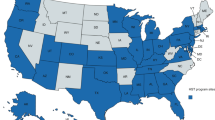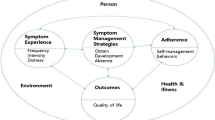Abstract
Non-compliance has received significant attention in medicine, yet few studies have examined its correlates in autologous hematopoietic SCT (AHSCT) patients. This study examined predictors of non-compliance in a sample of 151 AHSCT patients treated in an outpatient setting. Before AHSCT, participants completed a validated measure of mood and retrospective chart reviews were conducted to assess non-compliance during AHSCT, defined as refusal of oral hygiene, prescribed exercise programs, oral nutrition and/or prescribed medications. We found 121 patients (80%) were non-compliant with an aspect of the AHSCT regimen on 1 or more days; mean percentage of non-compliant days was 16.6 (s.d. 15.6). Men were more likely than women to be non-compliant (P<0.05); as were participants with an elevated depression score (P<0.05). Stepwise regression models identified significant predictors of non-compliance: gender, depression, global distress and nausea and vomiting severity (P-values all <0.01). Further analysis revealed that the interaction of the psychological variables with gender was a more robust predictor of non-compliance (P<0.001). For outpatient AHSCT, our findings suggest the need to broaden conceptualizations of risk factors for non-compliance and the importance of assessing patient barriers to compliance to ensure optimal treatment outcome.
This is a preview of subscription content, access via your institution
Access options
Subscribe to this journal
Receive 12 print issues and online access
$259.00 per year
only $21.58 per issue
Buy this article
- Purchase on Springer Link
- Instant access to full article PDF
Prices may be subject to local taxes which are calculated during checkout
Similar content being viewed by others
References
Toor A, Ayers J, Strupeck J, Parthsarathy M, Creech S, Rodriguez T et al. Favourable results with a single autologous stem cell transplant following conditioning with busulphan and cyclophosphamide in patients with multiple myeloma. Br J Haematol 2004; 124: 769–776.
Rodriguez T, Stiff P . Current treatment results of allogeneic bone marrow transplantation for acute myeloid and lymphoid leukemia. Curr Hematol Rep 2003; 2: 295–301.
Dix SP, Geller RB . High-dose chemotherapy with autologous stem cell rescue in the outpatient setting. Oncology 2000; 14: 171–185.
Stiff P, Mumby P, Miller L, Rodriguez T, Parthswarthy M, Kiley K et al. Autologous hematopoietic stem cell transplant that utilize total body irradiation can safely be carried out entirely on an outpatient basis. Bone Marrow Transplant 2006; 38: 757–764.
Jantunen E . Autologous stem cell transplantation beyond 60 years of age. Bone Marrow Transplant 2006; 38: 715–720.
Johnson W, Kerridge I, Milton C, Carr D, Enno A, Bray L et al. Hospital in the home (HITH) care following autologous stem cell transplantation for lymphoma and multiple myeloma. Aust J Adv Nurs 2006; 23: 34–39.
Fish J, Grupp S . Stem cell transplantation for neuroblastoma. Bone Marrow Transplant 2008; 41: 159–165.
Fernandez H, Escalon M, Pereira D, Lazarus H . Autotransplant conditioning regimens for aggressive lymphoma: are we on the right road? Bone Marrow Transplant 2007; 40: 505–513.
Lee SJ, Loberiza FR, Antin JH, Kirkpatrick T, Prokop L, Alyea EP et al. Routine screening for psychosocial distress following a hematopoietic stem cell transplantation. Bone Marrow Transplant 2005; 35: 77–83.
Foster L, McLellan L, Rybicki L, Dabney J, Visnosky M, Bolwell B . Utility of the psychosocial assessment of candidates for transplantation (PACT) in allogeneic BMT. Bone Marrow Transplant 2009; 44: 375–380.
Andrykowski M, Brady M, Henslee P . Psychosocial factors predictive of survival after allogeneic bone marrow transplantation for leukemia. Psychosom Med 1994; 56: 432–439.
Rodrigue J, Pearman T, Moreb J . Morbidity and mortality following bone marrow transplantation: predictive utility of pre-BMT affective functioning, compliance, and social support stability. Int J Behav Med 1999; 6: 241–254.
Haynes RB . Introduction. In: Haynes RB, Sackett DL, Taylor DW (eds). Compliance in Health Care. Johns Hopkins University Press: Baltimore, MD, 1979, pp 1–10.
Fox W . Self administration of medications. Bull Int Union Against Tuberc 1962; 32: 307–331.
Marston M . Compliance with medical regimens: a review of the literature. Nurs Res 1970; 9: 312.
Becker M, Maiman L . Sociobehavioral determinants of compliance with health and medical care recommendations. Med Care 1975; 13: 10–24.
Ayres A, Hoon J, Franzoni K, Matheny K, Cotanch P, Takayanagi S . Influence of mood and adjustment to cancer on compliance with chemotherapy among breast cancer patients. J Psychoso Res 1994; 38: 393–402.
Bandura A . Health promotion by social cognitive means. Health Educ Behav 2004; 31: 143–164.
Greenstein S, Siegal B . Compliance and noncompliance in patients with a functioning renal transplant: a multicenter study. Transplantation 1998; 66: 1718–1726.
Kiley D, Lam CS, Pollak R . A study of treatment compliance following kidney transplantation. Transplantation 1993; 55: 51–56.
Redding C, Rossi J, Rossi S, Velicer W, Prochaska J . Health behavior models. Int Electronic J Health Educ 2000; 3 (Special Issue): 180–193.
DiMatteo M, Lepper H, Croghan T . Depression is a risk factor for noncompliance with medical treatment: meta-analysis of the effects of anxiety and depression on patient adherence. Arch Intern Med 2000; 160: 2101–2107.
Stiff P, Miller L, Mumby P, Kiley K, Batiste R, Porter N et al. Patients' understanding of disease status and treatment plan at initial hematopoietic stem cell transplantation consultation. Bone Marrow Transplant 2006; 37: 479–484.
Derogatis LR, Spencer M . The Brief Symptom Inventory: Administration, Scoring Procedures Manual-I. Clinical Psychometric Research: Baltimore, MD, 1997.
Charlson ME, Pompei P, Ales KL, MacKenzie CR . A new method of classifying prognostic comorbidity in longitudinal studies: Development and validation. J Chronic Dis 1987; 40: 373–383.
Cohen J . Statistical Power Analysis for the Behavioral Sciences, 2nd edn. Lawrence Erlbaum Associates: Hillsdale, NJ, 1988.
Cohen J, Cohen P . Applied Multiple Regression/Correlation Analysis for the Behavioral Sciences, 2nd edn. Lawrence Erlbaum Associates: Hillsdale, NJ, 1983.
Johnson SB, Carlson DN . Medical regimen adherence: concepts, assessment, and interventions. In: Haynes RB, Sackett DL, Taylor DW (eds). Compliance in Health Care. Johns Hopkins University Press: Baltimore, MD, 1979, pp 329–354.
Alam N, Shepherd T, Winton T, Graham B, Johnson D, Livingston R et al. Compliance with post-operative adjuvant chemotherapy in non-small cell lung cancer: an analysis of National Cancer Institute of Canada and intergroup trial JBR 10 and a review of the literature. Lung Cancer 2005; 47: 385–394.
Siegal BR, Greenstein SM . Postrenal transplant compliance from the perspective of African-Americans, Hispanic-Americans, and Anglo-Americans. Adv Ren Replace Ther 1997; 4: 46–54.
Yavuz A, Tuncer M, Erdogan O, Gurkan R . Is there any effect of compliance on clinical parameters of renal transplant recipients? Transplant Proc 2004; 36: 120–121.
Courtenay WH, McCreary DR, Merighi JR . Gender and ethnic differences in health beliefs and behaviors. J Health Psychol 2002; 7: 219–231.
Bebbington P . Sex and depression. Psychol Med 1998; 28: 1–8.
Nolen-Hoeksema S . Sex differences in unipolar depression. Psychol Bull 1987; 101: 259–282.
Syrjala KL, Langer SL, Abrams JR, Storer B, Sanders JE, Flowers MED et al. Recovery and long term function after hematopoietic cell transplantation for leukemia or lymphoma. JAMA 2004; 291: 2335–2343.
Angst J, Gamma A, Gatspar M, Lepine JP, Mendelwicz J, Tylee A . Gender differences in depression: epidemiological findings from the European DEPRES I and II studies. Eur Arch Psychiatry Clin Neurosci 2002; 252: 1433–1478.
Warren L . Male intolerance of depression: a review with implications for psychotherapy. Clin Psychol Rev 1983; 3: 147–156.
Chubineh S, McGowan J . Nausea and vomiting in HIV: a symptom review. Int J STD AIDS 2008; 19: 723–728.
Li B, Brown W, Ampil F, Burton G, Yu H, McDonald J . Patient compliance is critical for equivilant clinical outcomes for breast cancer treated by breast-conservation therapy. Ann Surg 2000; 231: 883–889.
Ito S, Takachi S, Inoue M, Kurahashi N, Iwasaki M, Sasazuki S et al. Education in relation to incidence of and mortality from cancer and cardiovascular disease in Japan. Eur J Public Health 2008; 18: 466–472.
Author information
Authors and Affiliations
Corresponding author
Ethics declarations
Competing interests
The authors declare no conflict of interest.
Additional information
This work was presented in part at the American Psychosocial Oncology Society meeting, 2005.
Rights and permissions
About this article
Cite this article
Mumby, P., Hurley, C., Samsi, M. et al. Predictors of non-compliance in autologous hematopoietic SCT patients undergoing out-patient transplants. Bone Marrow Transplant 47, 556–561 (2012). https://doi.org/10.1038/bmt.2011.129
Received:
Revised:
Accepted:
Published:
Issue Date:
DOI: https://doi.org/10.1038/bmt.2011.129
Keywords
This article is cited by
-
A qualitative study on patients’ and their support persons’ preferences for receiving one longer consultation or two shorter consultations when being informed about allogeneic hematopoietic stem cell transplantation
BMC Health Services Research (2021)
-
Psychosocial Assessment of Candidates for Transplantation scale (PACT) and survival after allogeneic hematopoietic stem cell transplantation
Bone Marrow Transplantation (2019)
-
Patient eligibility for hematopoietic stem cell transplantation: a review of patient-associated variables
Bone Marrow Transplantation (2019)
-
Psychosocial risk predicts high readmission rates for hematopoietic cell transplant recipients
Bone Marrow Transplantation (2018)
-
Pretransplant Psychological Assessment for Stem Cell Treatment
Journal of Health Service Psychology (2018)



